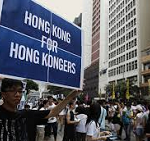I was in mainland China for a 10-day vacation. When I returned to Singapore by the end of September, I found news reports on Hong Kong flashing everywhere. Of course, media censorship in mainland China is not notable anymore. I was surprised because my hosts were mainlanders who either lived in Hong Kong or went there frequently for work or leisure, yet they’d never mentioned the protests. To them, protests in Hong Kong are routine, “As normal as how the Hongkongers look down on mainlanders,” one replied after I questioned why she hadn’t told me about the protests.
The umbrage is mutual. Since Hong Kong’s return in 1997, with its day-by-day closer ties to the mainland, Hongkongers have been increasingly stressed: rude mainland tourists stroll the city, pregnant women from the mainland fill the hospitals so that their babies are born as permanent residents, milk powders in Hong Kong are continuously out of stock after the mainland poisonous milk powder scandal, mainland students and job hunters have reduced job opportunities for locals, housing prices have increased dramatically with investments from mainland China… and now Beijing has ruled out open nominations of the chief executive candidates in 2017.
With China’s stellar rise, Hong Kong, under the “One country, two systems”, somehow is losing its edges. Economically, Hong Kong is finding itself in stiff competition from China’s major cities and other players in the region. Politically, Hong Kong’s privileges since 1997 have always been under the shadow of Beijing’s tough stance and strong political control. Hong Kong’s linguistic specialty is also losing its competitiveness. With Cantonese as the mother tongue for most locals, it faces difficulties dealing with mainland tourists and investors in Mandarin. English is no longer Hong Kong’s special weapon as cities like Shanghai rise and mainland China integrates itself more into the international system. Moreover, Hong Kong’s role as the supreme cultural exporter in the region is failing. Its entertainment industry and lifestyle used to be of great influence in the region. However, its status of role model is no longer sustainable, as culture in the region diversifies and becomes more international.
Questions on Beijing’s sincerity in maintaining Hong Kong’s wellbeing arise – Beijing’s acts on Hong Kong are made in the Chinese Communist Party’s (CCP) political system and they are mostly motivated to solidify the regime.
The most recent series of protests reflect Hong Kong’s struggling position under the current situation. Hong Kong, as part of China, is having problems embracing the closeness with the mainland due to its higher level of development, unique political and economic system. However, it is unable to deviate itself from China completely but only to request more political freedom, which seems to be the only option to turn around the situation.
Even though protests in June and September are both pro-democracy, a closer examination of the themes reflects its identity crisis. The June protests were in a memorial for students who died in the Tiananmen Incident, featuring slogans such as “Anti-CCP is Loving our nation (反党就是爱国).” The students died or injured in Tiananmen Square in 1989 were called “同胞” (compatriots or brothers). In this context, the protests identified Hong Kong as part of the nation and targeted the CCP regime.
Protests in September, however, have requests based on the identity of the Hongkonger, such as the call for universal suffrage – “Hong Kong for Hongkongers.” The attempts to unload political pressure from Beijing reflect Hongkongers’ wish to run the city’s issues by themselves. The concept excludes other parts of China including the central government in Beijing.
Different protest themes also show a lack of professional coordination from the protestors. How the situation progresses depends on whether the protesters will get sustained back-up or not. Given the government’s superior capacity for control and violence, public sympathy typically goes to the underdog – the protestors. During the Tiananmen Incident where protesting students received lots of civil support, it was not necessarily based on an explicit anti-government attitude but more from the heartbreaking scenes in the square when conflicts escalated between students and the military.
Beijing may have learnt lessons from this incident therefore the government refrains from overt violence. In fact, there aren’t many political options left for Beijing on this issue. Despite the tough and principled style of Xi Jing Ping’s administration, with unrest in Tibet, Xinjiang and issues of Taiwan, it’s very unlikely that Beijing will set the precedent of giving in on principle. The protestors are aware that the protests probably won’t shake the dragon, so there won’t be any brinkmanship; yet they still wish to “voice themselves, voice Hong Kong.”
From outside of the box, it truly reflects Hong Kong’s identity crisis rooted in the transition from a British colony and its “one country, two systems” misgivings.
Ying Pei is a Research Assistant at the Centre on Asia and Globalisation, Lee Kuan Yew School of Public Policy at the National University of Singapore. Her interests mainly lie in China’s reform, security issues in East Asia, decision making in China, as well as China’s diplomatic strategies.
This article was exclusively written for Gateway House: Indian Council on Global Relations. You can read more exclusive content here.
For interview requests with the author, or for permission to republish, please contact outreach@gatewayhouse.in.
© Copyright 2014 Gateway House: Indian Council on Global Relations. All rights reserved. Any unauthorized copying or reproduction is strictly prohibited


